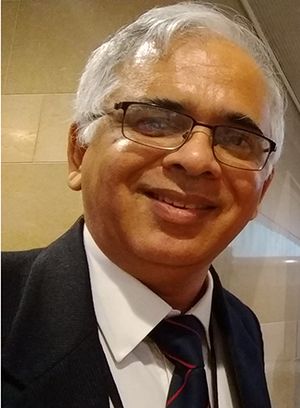As the world looks desperately at the ongoing drug and vaccine trials to tackle Covid-19, Dr Shekhar C. Mande, DG, Council of Scientific and Industrial Research, says the next three to four weeks are crucial. Of the 37 laboratories under the CSIR, many are working round the clock to develop various solutions such as drugs, vaccines and hospital equipment that will help India’s fight against the pandemic. The challenge, Mande says, is scientists are yet to fully understand the virus. “Once we do that, it will be easier to design a drug or a vaccine.”
Excerpts from an interview:
Q/ What is the CSIR’s core strategy in fighting Covid-19?
A/ We decided early on to work on a core group strategy with four verticals and one horizontal. These include surveillance through digital and molecular methods, rapid and economical diagnostics, new/re-purposed drugs, hospital-based equipment and PPEs and supply chain and logistics support systems. There is another vertical that we have just begun thinking on, about how CSIR technology can be used to support income-generation activities for those who have gone back to their villages.
Q/ The laboratories under the CSIR recently received the nod for testing. How has that panned out?
A/ Fifteen laboratories are doing the RT-PCR (reverse transcription polymerase chain reaction) testing. The challenge with RT-PCR tests is the paucity of trained people to conduct the tests, sourcing the kits and, if the numbers rise exponentially, the number of RT-PCR machines. We are also training a large number of people to do these tests.
One of our laboratories has developed a low-cost, paper-strip test which can detect the new coronavirus within an hour. This test will not require the use of an RT-PCR machine. The Indian Council of Medical Research’s approval for Truenat beta CoV test will also help, since it is made in India. This is a screening test, and all positives will have to go for a RT-PCR test. But it will help decrease the load on the laboratories. We haven’t been able to work very much on serum-based diagnostics. Serological tests are also tricky—antibodies take about 7-10 days to develop. For example, if you are virus positive but serum negative, it means you are early in the infection, but have not developed antibodies. If you are serum positive but RT-PCR negative, it means you had the infection at some point, and recovered without knowing about it.
Q/ After the National Institute of Virology, two CSIR labs are working on sequencing the SARs-CoV-2 genome.
A/ Yes, the Hyderabad-based Centre for Cellular and Molecular Biology and the Institute of Genomics and Integrative Biology, Delhi, are working on sequencing the virus samples from different parts of the country. If a person in Delhi gets it, and he had travelled to Goa, Tamil Nadu, Kerala, etc, a genome sequence can help in reconstructing the history of where the person picked it up from. So we can go back to that area and alert people there. Sequencing will also help us understand whether there are mutations in critical regions, and hence, drug resistance. It will also help in answering questions such as whether Indians have immunity to the virus since we have fewer cases compared with other countries.
Q/ What about new/repurposed drugs?
A/ We are closely watching the clinical trials of drugs that are being tested. The plan is to be ready to make these drugs as soon as any of the trials give positive results. For instance, the drug Favipiravir [anti-viral used to treat influenza in Japan], is being tested for Covid-19. Now, making the drug requires several steps, and you need to have all the ingredients to make it. So we are working overtime to synthesise such drugs, so that as soon as they are clinically evaluated and approved, they can be made in India from the very next day. If we wait for the drugs to get regulatory approvals and then start synthesising, there will be a gap of four to five weeks. We have also synthesised the two anti-HIV drugs that are currently under trial for Covid treatment.
Besides, we are also going to begin trials of our own, with the extract of Cocculus hirsutus, a tropical, invasive creeper with the common name broom creeper or Patalgarudi. The plant is used as a medicine in some areas of Madhya Pradesh by the tribals. This is already in phase-2 clinical trials for dengue, and since we found some similarity between the dengue virus and the new coronavirus, we will be starting human trials shortly. Some hospitals have been roped in for this. We are also working with the Ayush ministry to take up four other botanicals for trials.
Q/ What about vaccine research?
A/ We are planning to test the Mw (Mycobacterium w) vaccine for Covid-19. The Mw vaccine is used against leprosy. It is an immune booster. The bacterium was discovered in India. The world is talking about the BCG vaccine now, and Mw is a cousin of the BCG vaccine. The trials will start in another week or so. At this stage, it is hard to say whether it will be a drug or a vaccine, first. The next three to four weeks are crucial.
Q/ What about hospital equipment?
A/ We are working on masks, gloves, PPEs, ventilators, oxygen enriching equipment and thermometers. Two of our labs have created a 3-D printing mask that has already been transferred to the industry for mass production. We are also looking at two ventilator designs which are being transferred to the industry. The Central Building Research Institute, Roorkee, is working with some state governments to build makeshift hospitals. The construction of one such hospital has already started in Haridwar.
Q/ How has the industry responded?
A/ Everything that we spoke about has an industry element to it. No one is thinking about profits right now. Everyone is concerned about society.


